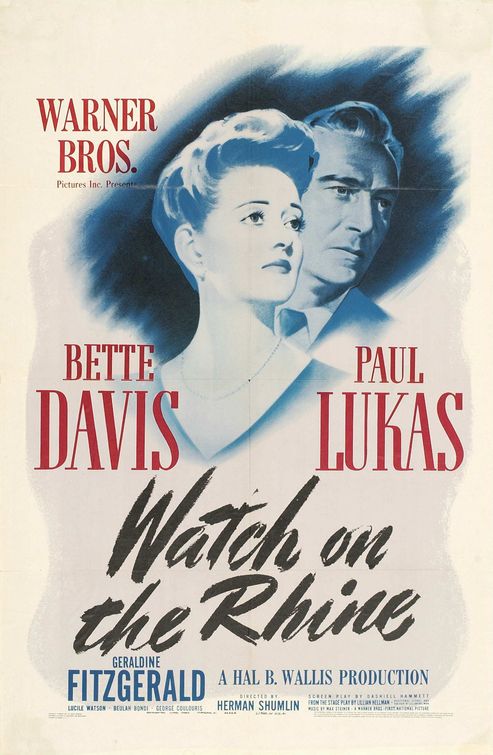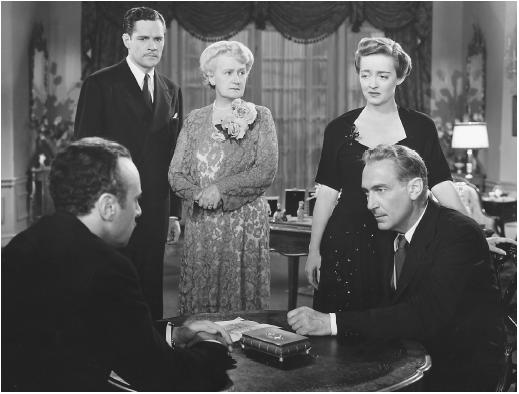Cinematic rumination and reviews, with a pronounced weakness for Classic Hollywood
Saturday, 30 October 2010
Watch on the Rhine (1943)
Dir.: Herman Shumlin
Plot: An anti-Nazi resistance fighter and his family flee to the United States, but their safety proves more uncertain than expected.
"What is your trade?"
"I? I fight against Fascism. That is my trade."
Has there ever been a more heroic exchange in the history of cinema? My chest is swelling just typing it out. Anyway, Watch on the Rhine is best remembered these days a) for being written by Lillian Hellman and b) for denying Bogart the Best Actor Oscar that many felt was in the bag after the runaway success of Casablanca. However, it more than stands up on its own merits and in some respects outstrips that legendary blockbuster - in depth of psychological understanding and a much more realistic depiction of the heartbreaking decisions that face those who would stand against the Fascists.
The story follows a family arriving in America after years of fleeing around Europe. The wife, Sarah, (Bette Davis) is an American citizen who looks forward to returning to the luxury of her wealthy Washington family after the trials of Nazi-dodging. The husband, Kurt, (Paul Lukas) is a German engineer turned Resistance fighter who has finally consented to leave Europe and recover his strength after years of risking his life sabotaging the Fascists. With them are their three children, who speak in a curious, stiff English which I eventually realised was supposed to represent that it is their second language. They arrive at Sarah's mother's house, but they are not the only houseguests. Also staying are a family friend and her bullish Romanian husband, who is, to put it lightly, somewhat suspicious. And a massive Nazi. Spoiler.
Watching it for the second time, I realise that Watch on the Rhine is a really great movie, mature and deeply heartfelt. It might not have the immediate flash and sparkle of Casablanca, but its treatment of the painful effects of war on civilians is incredibly incisive and moving. The film does a really good job of communicating the hardship and suffering these people have suffered before we first meet them, a deep air of weariness and loss of innocence hangs from every scene. Much of the credit for this must go to Bette Davis and Paul Lukas as the central couple, who turn in masterfully underplayed performances which never ring less than intensely true. Even thinking about the scene where he sees her in her new dress puts a lump in my throat...
It is a fantastic pairing, and Lukas really excels as the increasingly torn family man who cannot forget his responsibilities, even if they put his life at risk. One of my personal favourite character actors, he has here a presence which oozes with repressed emotion and quiet melancholy. I was somewhat amused, though, to read that apparently the vocally left-wing Hellman despised the poor fellow for refusing to become involved in politics and take a stance as the war approached. She seemingly decided the overlook the fact that his role in this film and in an anti-Fascist propaganda short (deliciously titled Don't Be A Sucker!) made his beliefs fairly clear, and that he had spent the First World War mired in the horror of the collapsing Austo-Hungarian empire and was understandably reluctant to relive a similar experience.
The plot is standard Nazi scheming fare, but what makes it stand out is the seriousness with which it takes its subject. It never for one moment lets the film's tone approach a caper, but hammers home the psychological effects of killing, of separation and of prolonged danger on family life. An important war film and one that should be better known.
8/10
Subscribe to:
Post Comments (Atom)



I agree whole-heartedly with your review of "Watch on the Rhine". Paul Lukas is an actor I always enjoy, but here in the role he created on Broadway, he inhabits a character full of so much humanity and dignity that I cannot praise him enough.
ReplyDelete